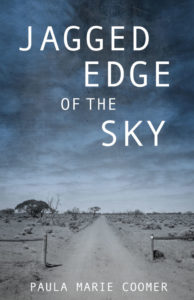 How could I not love a book that I edited?
How could I not love a book that I edited?
The editing process is an engagement with the author, the story, the language and the whole universe of a work of art. Although I have not created this art, I have observed and stoked it.
The astonishing part of editing Jagged Edge of the Sky was the opportunity to observe the generative brilliance of Paula Marie Coomer’s creative mind. This deep-keeled tale unfolds in a series of vignettes that span multiple generations on two continents. The connections aren’t instantly apparent, but long after you put the book down, the details will continue to reassemble themselves in your mind, giving you one satisfying aha! moment after another.
It is in this spirit that I offer the following discussion questions:
1. Draw a “family tree” that shows how the characters in the novel are related to one another. In addition to blood relationships, show other important bonds, such as strong friendships or shared experiences. At what point in your reading of the novel did you feel like you had a grasp of how all the characters are related?
2. The chapters in the book are not of equal length. Do you think chapter length reflects the importance of the character in the big story? Take Merl Chatcolet, for example. The chapter with his name is very short. What else do you know about Merl? Could you write his biography? If Merl were to tell all that he knows of the people in the novel, what would he say? What role does Merl play in his community? Are there other characters in other communities in the novel playing similar roles?
3. Economy of language’ is the phrase that describes the effort an author makes to write sentences and paragraphs where every word matters—no extras and no fluff. Identify some passages in the novel where the economy of language is particularly high. Look for places where a whole lot of detail (information, imagery) is conveyed in just a few lines, or a even a few words.
4. What role does poverty play in the novel? How do you define “poverty”? Which characters do you think would have made different decisions if they’d had more resources? What resources? What decisions? Is the lack of resources always connected to poverty?
5. At the end of the book, the author lists works that were influential in the writing of Jagged Edge of the Sky. Are you familiar with some of them? What influence do you think they might have had? Some of the books on the list are stories of people whose lives are interconnected over generations. Do you think Jagged Edge of the Sky is a “typical” family saga? How is it like and not-like other novels of this kind that you have read?
6. What is alternative fiction? Alternative to what? What is the opposite of “alternative”? Consciously or unconsciously, readers bring expectations to a novel. What expectations of yours were thwarted? What “rules” of novel-writing did the author seem to be breaking? At some point, this rule-breaking can become too much for readers and they give up. Does this novel run that risk? Is the satisfaction of understanding how all the pieces are interrelated worth the effort it takes to remember it all and figure it out?